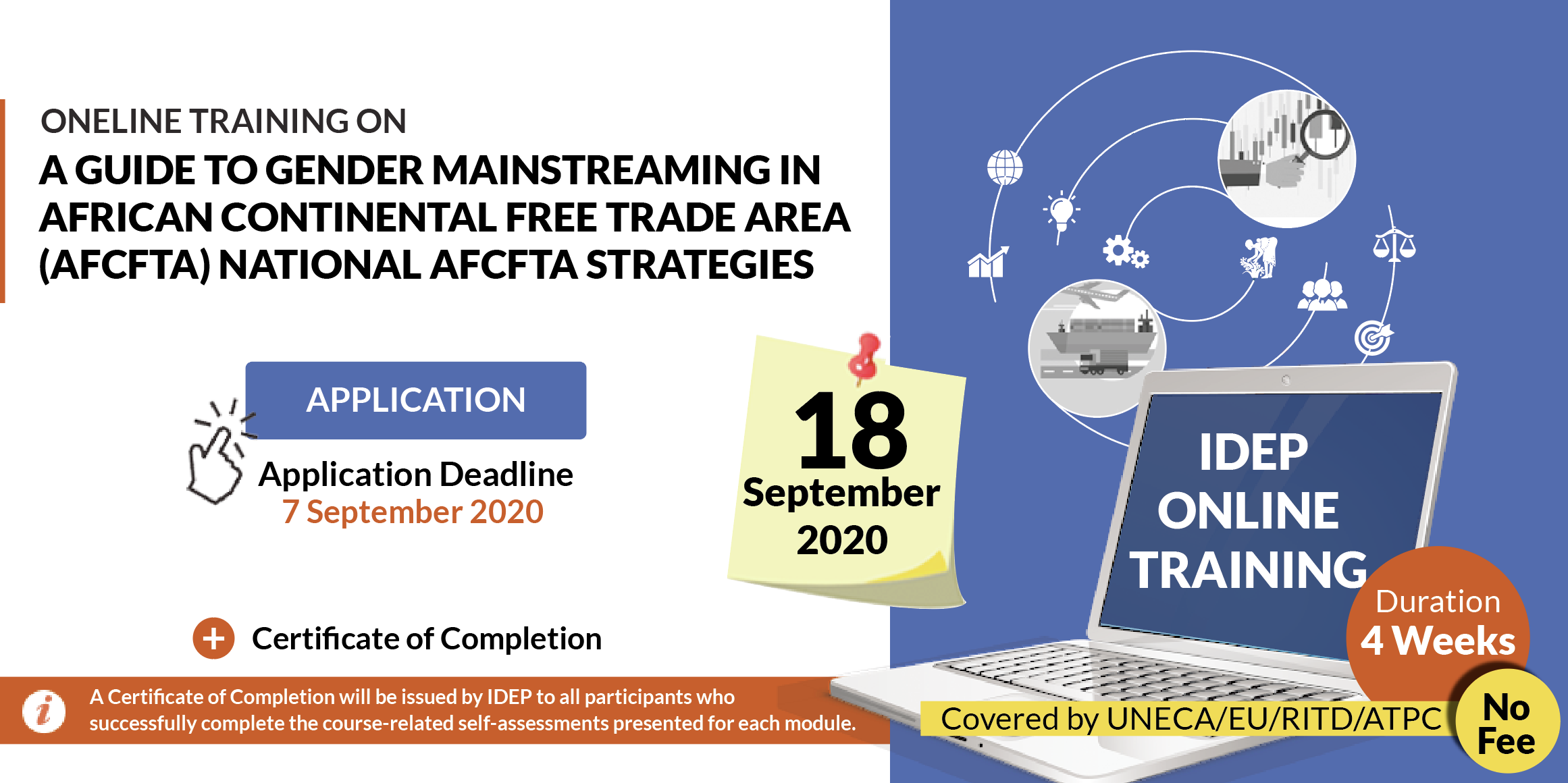A Guide To Gender Mainstreaming in African Continental Free Trade Area (AfCFTA) National AfCFTA Strategies
PROGRAM RATIONALE
On 30 May 2019, the Agreement Establishing the African Continental Free Trade Area (AfCFTA) came into force, establishing a single market of 1.27 billion consumers with an aggregate GDP between US $2.1 and $3.4 trillion. The AfCFTA has the potential to generate direct and indirect employment - in particular for women and young Africans, while advancing food security, agriculture and infrastructure development goals. While the AfCFTA Agreement does not incorporate a separate chapter on gender and trade, the Agreement explicitly recognises the importance of gender equality.
Article 3(e) specifies that the AfCFTA aims to “promote and attain sustainable and inclusive socio-economic development, gender equality and structural transformation”. Likewise, Article 27(d) of the AfCFTA Protocol on Trade in Services makes explicit reference to improving the export capacity of formal and informal service suppliers, with particular attention to micro, small and medium-sized operators and “women and youth service suppliers”. Notwithstanding these explicit and numerous other implicit provisions in the AfCFTA Agreement that could foster women’s economic empowerment, benefits for women are not automatic. Indeed, intra-African trade liberalization could exacerbate existing gender gaps if the necessary steps are not taken to prevent — or alleviate — potential adverse effects arising from AfCFTA market liberalization.
Trading under the AfCFTA Agreement was slated to commence on 1 July 2020, but was postponed as a result of the COVID-19 pandemic. With attention shifting to 2021 as the start of trading under the AfCFTA, the litmus test will be the speed at which African Union (AU) Member States can implement the Agreement. Although negotiated at the continental level, much of the trade gains from the AfCFTA will be at country level. Member States, however, cannot assume that new trade opportunities will be equitably distributed, nor automatically translate into higher levels of employment. To advance the promotion of gender equality as one of the general objectives of the AfCFTA Agreement, there needs to be a deliberate effort to integrate a gender-sensitive approach to AfCFTA implementation.
In practice, this would require AfCFTA State Parties to develop and mainstream gender in National Strategies to implement the AfCFTA Agreement.
As COVID-19 spreads rapidly across the continent, evidence highlighting the disproportionate economic and social impact of the pandemic on women is clear. The vast majority of women’s employment is in the informal sector, which has been worst hit by the economic fallout of COVID-19. Border closures have cut off livelihoods of entire communities that depend on trading carried out by small-scale and informal cross-border traders, who are predominantly women. Women are also disproportionately represented in industries that are more affected by COVID-19, including leather, textiles and apparel. Likewise, the pandemic has put in peril other sectors that women depend on for their livelihoods, including smallholder farming, horticulture, travel, tourism and hospitality. Of particular concern, is the exponential increase in gender-based violence of all types.
Notwithstanding these challenges, there is a unique opportunity in a post-pandemic Africa to put women at the centre of building back more inclusive economies that serve the AU Agenda 2063 and the broader 2030 global agenda that “leaves no one behind”. Extending equal economic participation to women in the AfCFTA requires policy makers to analyse both the opportunities for and potential barriers to inclusive gains. In an effort to enhance the knowledge of policy makers and other key stakeholders on how to advance gender equal outcomes in AfCFTA implementation, the African Trade Policy Centre (ATPC) and the Institute for Economic Development and Planning (IDEP) are organizing a four-week online course entitled “A Guide To Gender Mainstreaming in National AfCFTA Strategies”.
LEARNING OBJECTIVES
The objective of the course is to assist policy makers and practitioners in the design of targeted gender- responsive policies and complementary measures to ensure that women can leverage new opportunities and benefits of the AfCFTA. To this end, the course aims to provide guidance and a practical approach to integrating a gender dimension in the AfCFTA, specifically through the process of gender mainstreaming in National AfCFTA Strategies. At the end of the course, participants will be able to :
- Understand how key provisions in the AfCFTA Agreement can be leveraged to advance gender equality and economic empowerment opportunities for women, according to the key economic roles they play.
- Design a strategy for mainstreaming gender in National AfCFTA Strategies and/or other instruments to implement the AfCFTA Agreement; and understand how to undertake gender analysis as a critical tool of gender mainstreaming.
- Understand the implications of the AfCFTA for women-owned business, small-scale and informal cross-border traders; analyze e-commerce impediments and opportunities to support effective AfCFTA implementation.
- Identify opportunities and gender-specific barriers confronting women in strategic economic sectors, including agriculture, manufacturing and services.
- Adapt and apply the learning materials to country contexts when assessing the potential impact of the AfCFTA on women and men.
- Develop AfCFTA evidence-based policy responses that help to build back better in longer-term post-COVID-19 economic recovery efforts, with gender equality, sustainability and human rightsat the core.
